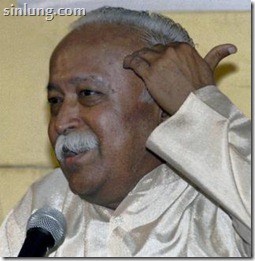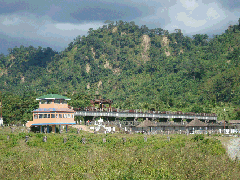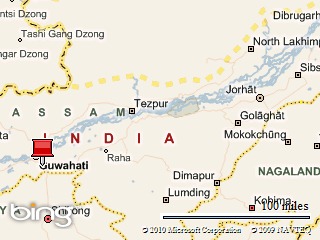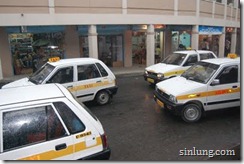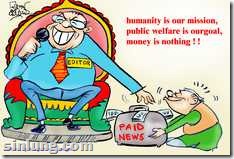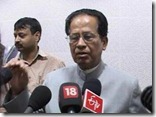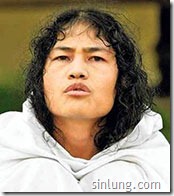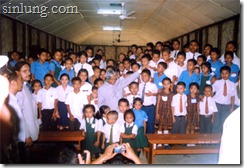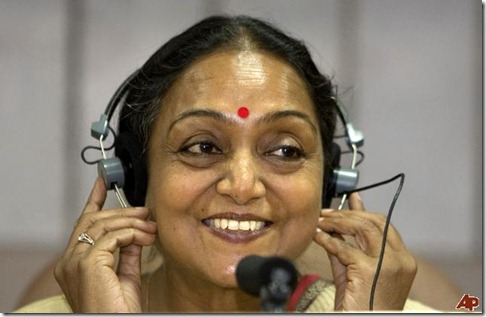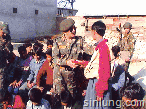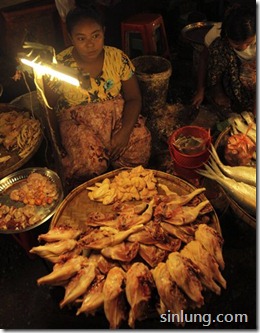An outstanding feature of the conflict framing seen in newspapers here is the fact that it is rooted in Christian theology. What makes journalism in Nagaland unique is that what is acceptable here would not be acceptable in most other parts of an officially secular country.
By Sevanti Ninan with Athili Anthony Sapriina
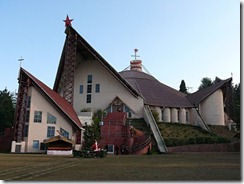 Kohima Cathedral
Kohima Cathedral
The media is a significant player in any region with a history of ongoing conflict, violent or otherwise. What makes journalism in Nagaland unique is that what is acceptable here would not be acceptable in most other parts of an officially secular country.
The outstanding feature of the conflict framing seen in newspapers here is the fact that it is rooted in Christian theology and that is accepted as the norm.
Editorials are written invoking Biblical injunctions. Guest contributions are frequent written by priests. Politicians exhort the people using a biblical context.
There is therefore a substantial component of religious contextualizing, even exhortations, in the daily press.
Such as, On our part, we sincerely regard the reconciliation process as a channel of blessing to the Nagas and shall honor the 'Covenant of Reconciliation'. We shall not be found wanting in our quest for peace.
Col. Levi Zimik
PRO/IPR Naga Army
Posted on Friday, October 02, 2009
Or,
NPMHR questions factional feud
The Naga Peoples Movement for Human Rights (NPMHR) also expressed deep anguish and disgust at the recent 'reappearance of armed clashes and killings of cadres between the two NSCN(s) groups in Tirap district Arunachal Pradesh on March 12, 2009 and around Bhandari in Wokha, Nagaland on March 14, 2009. 'Whatever may be the justification or counter allegations made by both groups, NPMHR questions the factional feud and considers it as going against the spirit of turning swords into ploughshares', stated a press communiqué' issued by Dr. N. Venuh, Secretary General of the NPMHR.
March 18, 2009 Morung Express
Religious sentiments, predominantly Christian, has always been the binding and also the reconciling factors in the Naga society and there has always been underlying religious influence on Naga nationalism. Newspapers in Nagaland bring a faith-based theme to the Naga conflict when they highlight the role of religion in the Naga issue.
Naga society is stepped in Christianity and the Church is a major influence on society. Christian religion is synonymous with Naga nationalism, even with the NSCN-IM carrying the slogan 'Nagaland for Christ,' which Th Muivah, Secretary of NSCN-IM said in an interview was the 'manifestation that Nagas can never part with their faith in Christ the savior.'
Newspapers editorials on the Naga issue oft underscore the religion theme. A Nagaland Post editorial 'A time to heal,' stresses that the common Christian faith is the common bond that brings different Naga tribes together.
'The Church therefore plays a vital role as a mediator for reconciliation. Biblically, the first step towards reconciliation is repentance before God and to seek forgiveness. From those who have been wronged and willingness to forgive by those who have been wronged.'
A significant proportion of the conflict or peace process coverage in Nagaland is also through primary texts, or the actual speeches and writings of the actors involved, often reproduced in full. One consequence of this is that newspapers become an unmediated medium, with the framing, which is frequently theological, remaining intact. For instance The Naga Forum for Reconciliation comprising of apex tribal bodies and organizations, set up in February 2008, uses newspapers to communicate its goals. In February 2009 when the Forum organised the Naga Convention for Reconciliation and Hope, the Forum’s convener Wati Aier made a speech which was carried in full by local newspapers, and which set out thus, his exhortation to all Nagas.
The FNR greets each of you in the name of our Lord and savior Jesus Christ!
On this momentous day, I humbly stand before the Naga people with awe:
' That God is sovereign and Lord of all nations and peoples and powerfully present in our midst!
' That the Naga spirit is alive and kicking! Your presence here this morning proves it all.
' I am in awe, to realize that the future of the Nagas is right here, at our disposal to be ushered in by the Nagas themselves!
Therefore, this is a decisive moment for us. What we decide here is going to be important. Let no one go away from here without making a fresh commitment to the Naga cause, indeed to our destiny.
When Aier is given conventional reporting treatment however, it comes across like this:
According to the forum?s convener, Rev. Dr. Wati Aier, the Naga Convention for Reconciliation and Peace will be a time for the Nagas to look at the current difficulties and 'trying to figure out as to where do we go from here'.
The meeting will dwell on reconciliation while also acknowledging and supporting the Naga political talks, on with the centre. 'We are not saying that the talks (Indo-Naga talks) should stop and reconciliation must happen. But we want that both the talks and reconciliation must be given equal emphasis' Dr. Aier said.
(Morung Express, 24 February, 2009)
It could be argued therefore that from an activist peace journalism point of view a Naga newspaper is being a more effective instrument for peace when it is functioning as an unmediated platform, rather than when it is practicing journalism.
Here are more examples of articles from newspapers with a religious theme.
An appeal for prayer by Arshing Sankhil, General Secretary, Council of Nagalim Churches MIP/GPRN (Nagaland Page -December 2, 2009)
Excerpts- As the council of Nagalim Churches brings this appeal at your door step, we bring it along with Christmas greetings at your home. ?May the joy of peace by upon you.
We would like to appeal to all the national workers to ardently uphold in prayers with fasting the following mentioned points on December 6, Sunday 2009, the National Fasting Day of the month
The collective leadership, that the leading hand of God may continually uphold them as they lead the Naga people along the way towards destination.
The Forum of Naga Reconciliation that God may lead and direct them in their every move for Naga Reconciliation process.
The Government of India and its rulers/leaders that God may give them courage, strength and wisdom so that they do not fail in their part of responsibility in solving the Indo-Naga political issue and inter-relation of the two nations
When compromise is an evil- Thepfulhouvi Solo (Nagaland Post, December 5, 2009)
Excerpts- Killings in Nagaland is said to have decreased because of forgive and forget good works of the peace workers. It is so through the prayer of the faithful but not wholly so. Normalcy seems to be descending on Nagaland because the violent parties have seen what has happened to terror Prahakaran and his world famous world?s greatest suicide organizations.
The sense of 'forgive and forget' not origination from the heart is not forgiveness. The Church and Churchmen in particular emphasizes the heart and not the head.
Culture of Violence- Morung Express Editorial (December 2, 2009)
Excerpts- We professes to be a Christian state and people but we have failed to live accordingly. This is our collective failure. Let us all bow our heads in shame.. But how long will we shame our self.
The right thing should be done at the right time- by Rev L Souhie Mhasi/ Readers Mirror- Letters & Views (Eastern Mirror, October 17, 2009)
Excerpts- Praises be to the God and thanked be to the leaders of the FNR for stoppage of killing. The agreement for reconciliation should be materialized whereby the reconciliation should be a holistic reconciliation.
Who is hampering peace and unity to prevail? By Reverend Vicahakielie Perheilie Khruomo, Founder, Christian Democratic Party. (October 28, 2009, Eastern Mirror /Readers Mirror)
Excerpts- Dear Nagas, who is hampering peace and unity to prevail in our land? Is it the money seekers? Is it the fame seekers? Or is it because of those who wrestle for leadership?
Whether NSCN-K, NNC or Federal, every factional leader are deeply concerned to unite Nagas and make them one. Among the Nagas, there have been lots of disunity, hatreds and killings and indulging in various sinful practices. Therefore, on the National Fasting and Prayer programme, NSCN (IM) General Secretary Th Muivah asserts that one of the greatest enemy is sin. Thus, unless we confess our sins and commit no more, it will devour the Nagas.
The Voice of God to Naga Freedom Fighters ? Imsu Jamir, Healing Prayer Centre (June 18, 2009-Eastern Mirror/Readers Mirror)
Excerpts- 'The Naga freedom fighter should lament bitterly thus says the Lord. You are searching peace and freedom but you are the destroyer of peace and freedom. Your efforts to achieve peace and freedom are getting lost and weakening every day because you have killed many innocent children of God whose voice have reached heaven thus say the Lord.
Therefore, I will curse you and even your children because you have committed unforgivable sin against God. Therefore some clans and groups who defile God shall be completely wiped out from existence thus say the Lord.
If the Nagas do not revive themselves and turn to God, your land shall become a land without human beings thus say the Holy Spirit- Mathew- 24:35 Luke- 21:33
Covenant of Reconciliation- Forum for Naga Reconciliation (FNR) (June 15, 2009 All local papers)
'Having been deeply convicted by God's call in Christ, and the voice of the Naga people, we hereby solemnly commit before God to offer our self to Naga Reconciliation and Forgiveness based on the Historical and Political Rights of the Nagas.
We resolve to continue to work together in this spirit of love, non violence, peace and respect to resolve outstanding issues amongst us.
Furthermore, we exhort and call upon other Naga groups to join us in Reconciling with each other?
The Morung Express had the following poll whose results goes against all of the above:
Do you Consider Nagaland as a Christian State ? Morung Express Polls
The Result
Yes 15 percent
No 67 percent
Others 18 percent
In this state forgiveness, soul searching and reconciliation for the Naga political issue always seems to be articulated in religious terms. From the articles contributed by readers to the local news papers with regard to the Naga political issue, there is always a point made on religion and faith. But the fact that the Naga 'national workers' as the cadres are called, do not follow the ideologies and principles of Christ's teaching has been an issue for many readers.
They wonder why the Naga national workers cheat, extort and kill their brethren, when they profess to be working for the freedom of the land and its people, under the benevolence and direction of God.
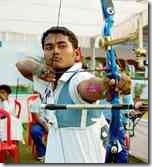 Two young journalists of Assam wrote a book, first of its kind, on the life and achievements of 51 Assam's sports persons who represented India in international events.
Two young journalists of Assam wrote a book, first of its kind, on the life and achievements of 51 Assam's sports persons who represented India in international events.




